- Duration of study: 6 semesters
- ECTS credit points: 180
- Academic degree: Bachelor of Science (BSc)
- Language of instruction: German
The Bachelor's Programme
The Bachelor's Degree Programme in Mathematics will provide you with highly versatile skills. After receiving a sound basic education in analysis methods and linear algebra, you will acquire knowledge and skills from a broad spectrum of core mathematical areas. These include: probability theory and statistics, differential equations, algebraic structures, discrete mathematics, numerical methods and optimisation, complex analysis and functional analysis. You will deepen this fundamental mathematical knowledge in a specialisation module of your choice.
The NAWI Graz Bachelor’s Degree Programme in Mathematics is offered jointly by TU Graz and the University of Graz. The Faculty has established an excellent international network. This means that you have many beneficial opportunities to take part in international exchange programmes and cooperation. International guest lecturers are invited regularly and lecturers from the business world are involved, providing you with practical insights into how the knowledge you learn can be applied.
You will gain further practical experience in the field of mathematics and learn how to apply this experience while conducting your bachelor’s thesis work. This work can be carried out as part of a company internship.
Play video
Studying Mathematics
You have the chance to specialise in one of the following focal areas:
Applied Mathematics: You will learn about mathematical modelling, stochastics, numerical mathematics, differential equations and their applications, such as image processing.
Data Science: You will learn more about statistical data analysis, machine learning, signal and image processing as well as combinatorial optimisation and deal with applications of data-based mathematical modelling in different application areas.
Discrete Mathematics and Algorithm Theory: You will learn more about algebra and discrete mathematics, as well as their applications in cryptography, combinatorial optimisation and theoretical computer science.
Financial and Actuarial Mathematics: You will acquire advanced knowledge about stochastics and differential equations. You will apply mathematical methods to solve problems in the finance and insurance industry. Through industrial cooperation partners, you will gain exciting practical insights.
Technomathematics: You will learn more about differential equations and numerical mathematics and learn how mathematics are used in the technology and engineering fields.
What will I have to do in the first semesters? How much practice can I expect? And what can I actually do with my degree when I've finished? Check what you expect!
A student and a lecturer will take time for all your questions and you will get to know TU Graz during on-site appointments. Up to 10 persons can participate at each date.
Contact: lse@tugraz.at
Mathematical methods and procedures are used in many fields of knowledge. In addition to scientific and technical fields, mathematics also plays a steadily growing role in medicine, as well as in the economic and social sciences.
With mathematics, step-by-step solutions can be found by applying analytical and forecasting methods and carrying out simulation procedures. These simulation procedures can, for example, be carried out to create computable mathematical models and replace expensive test series.
The Faculty of Mathematics, Physics and Geodesy at TU Graz has a fantastic international research reputation. The Faculty has excellent networks and participates in international mathematical research in a wide range of fields, such as analytical and probabilistic number theory, applied and probabilistic graph theory, applied and numerical mathematics, partial differential equations and mathematical physics, stochastic models of financial and actuarial mathematics, statistics and data science, arithmetic geometry, topological data analysis, approximation theory and discrete geometry, Monte Carlo methods and their applications.
Through close contacts to local businesses and industry, students can already gain practical experience during their bachelor's programme.
Admission
Requirements for admission to a bachelor's degree programme at TU Graz
Summer semester 2026
Admission period: 7 January to 5 February 2026
Winter semester 2026/27
Admission period: 6 July to 5 September 2026
Contact study@tugraz.at
Perspectives for Graduates
Graduates of the Bachelor's Programme in Mathematics qualify to enter further high-quality master's degree programmes. In Graz, these include the Master's Degree Programme in Mathematics or Computer Science. This internationally recognized bachelor's degree also qualifies you to conduct further studies outside of Austria.
Once they have completed a master's programme, mathematicians are in great demand in industry, business and science. They are employed, for example,
- to apply mathematical methods in industry, technology and natural science,
- to implement mathematical models in economics, administration, finance and insurance,
- to answer questions of data security and communication technology theoretically and practically,
- to develop methods without which devices and technologies used in modern everyday life would not exist, e.g. imaging techniques used in medicine and technology, communication and security used in data transmission, risk management used in the banking and insurance sectors and computer-aided procedures used in natural science and technology.
After completing the bachelor's degree programme, you can enrol in the following master’s degree programme without further requirements:
Information on other master's degree programmes with requirements you can find on the respective pages for the master’s degree programmes.
In addition, the bachelor's degree offers you the opportunity to apply internationally for master's degree programmes.





